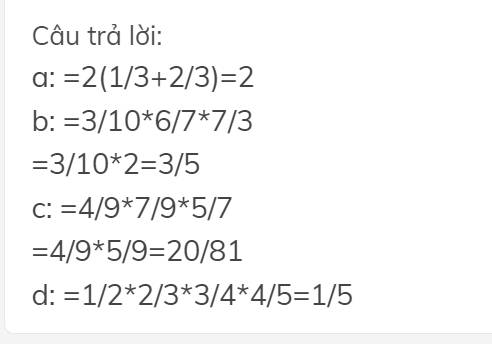( 1- 1/2 ) x ( 1 - 1/3 ) x ( 1 - 1/4 ) x .......x ( 1 - 1/9 )
Hãy nhập câu hỏi của bạn vào đây, nếu là tài khoản VIP, bạn sẽ được ưu tiên trả lời.


1) ĐKXĐ: \(x\notin\left\{1;-1\right\}\)
Ta có: \(\dfrac{x+1}{x-1}-\dfrac{x-1}{x+1}=\dfrac{4}{x^2-1}\)
\(\Leftrightarrow\dfrac{\left(x+1\right)^2}{\left(x-1\right)\left(x+1\right)}-\dfrac{\left(x-1\right)^2}{\left(x-1\right)\left(x+1\right)}=\dfrac{4}{\left(x-1\right)\left(x+1\right)}\)
Suy ra: \(x^2+2x+1-\left(x^2-2x+1\right)=4\)
\(\Leftrightarrow x^2+2x+1-x^2+2x-1=4\)
\(\Leftrightarrow4x=4\)
hay x=1(loại)
Vậy: \(S=\varnothing\)
2) ĐKXĐ: \(x\notin\left\{2;-2\right\}\)
Ta có: \(\dfrac{x+2}{x-2}+\dfrac{x}{x+2}=2\)
\(\Leftrightarrow\dfrac{\left(x+2\right)^2}{\left(x-2\right)\left(x+2\right)}+\dfrac{x\left(x-2\right)}{\left(x-2\right)\left(x+2\right)}=\dfrac{2\left(x^2-4\right)}{\left(x-2\right)\left(x+2\right)}\)
Suy ra: \(x^2+4x+4+x^2-2x=2x^2-8\)
\(\Leftrightarrow2x^2+2x+4-2x^2-8=0\)
\(\Leftrightarrow2x-4=0\)
\(\Leftrightarrow2x=4\)
hay x=2(loại)
Vậy: \(S=\varnothing\)

a: x*3/4=1/5
=>x=1/5:3/4=1/5*4/3=4/15
b: x*3/7=2/5
=>x=2/5:3/7=2/5*7/3=14/15
c: 1/3+2/9=2/12x
=>1/6x=3/9+2/9=5/9
=>x=5/9*6=30/9=10/3
d: 4/15*x-2/3=1/5
=>4/15*x=2/3+1/5=10/15+3/15=13/15
=>4x=13
=>x=13/4
e: x:1/7=2/3
=>x=2/3*1/7=2/21
f: 1/9:x=7/3
=>x=1/9:7/3=1/9*3/7=3/63=1/21
j: 1/4+5/12=8/3:x
=>8/3:x=3/12+5/12=8/12=2/3
=>x=4
h: =>7/4:x=1/5+1/2=7/10
=>x=7/4:7/10=10/4=5/2
thankkkkkkkkkkkkkkkkkkkkkkkkkkkkkkkkkkkkkkkkkkkkkkkkkkkkkkkkkkkkkkkkkkkkkkkkkkkkkkkkkkkkkkkkkkkkkkkkkkkkkkkkkkkkkkkkkkkkkkkkkkkkkkkkkkkkkkkkkkkkkkkkkkkkkkkkkkkkkkkkkkkkkkkkkkkkkkkkkkkkkkkkkkkkkkkkkkkkkkkkkkkkkkkkkkkkkkkkkk

1.1 Hình vuông có tối đa 4 góc vậy 4 hình vuông có tối đa 20 góc. S
2.1 hình vuông có tối đa 4 góc vậy 4 hình vuông có tối đa 16 góc. Đ
3. 1 hình vuông có tối thiểu 4 góc vậy 4 hình vuông có tối thiểu 16 góc. Đ
4.1 hình vuông có tối thiểu 1 góc vậy 4 hình vuông có tối thiểu 16 góc. S
Nhiêu đó hết tài năng rồi, mình mới lớp 3 thôi.

Câu 1 :
a, \(\frac{3\left(2x+1\right)}{4}-\frac{5x+3}{6}=\frac{2x-1}{3}-\frac{3-x}{4}\)
\(\Leftrightarrow\frac{6x+3}{4}+\frac{3-x}{4}=\frac{2x-1}{3}+\frac{5x+3}{6}\)
\(\Leftrightarrow\frac{5x+6}{4}=\frac{9x+1}{6}\Leftrightarrow\frac{30x+36}{24}=\frac{36x+4}{24}\)
Khử mẫu : \(30x+36=36x+4\Leftrightarrow-6x=-32\Leftrightarrow x=\frac{32}{6}=\frac{16}{3}\)
tương tự
\(\frac{19}{4}-\frac{2\left(3x-5\right)}{5}=\frac{3-2x}{10}-\frac{3x-1}{4}\)
\(< =>\frac{19.5}{20}-\frac{8\left(3x-5\right)}{20}=\frac{2\left(3-2x\right)}{20}-\frac{5\left(3x-1\right)}{20}\)
\(< =>95-24x+40=6-4x-15x+5\)
\(< =>-24x+135=-19x+11\)
\(< =>5x=135-11=124\)
\(< =>x=\frac{124}{5}\)

\(\frac{3}{x+1}+\frac{2}{x+2}=\frac{5x+4}{x^2+3x+2}.\)ĐKXĐ: \(x\ne-1;-2\)
\(\Leftrightarrow\frac{3\left(x+2\right)}{\left(x+1\right)\left(x+2\right)}+\frac{2\left(x+1\right)}{\left(x+1\right)\left(x+2\right)}=\frac{5x+4}{\left(x+1\right)\left(x+2\right)}\)
\(\Leftrightarrow3x+6+2x+2=5x+4\)
\(\Leftrightarrow3x+2x-5x=-6-2+4\)
\(\Leftrightarrow0x=-4\)
=> PT vô nghiệm
\(2;\frac{2}{3x-1}-\frac{15}{6x^2-x-1}=\frac{3}{2x-1}\)
\(\Leftrightarrow\frac{2\left(2x-1\right)}{\left(2x-1\right)\left(3x-1\right)}-\frac{15}{6x^2+3x-2x-1}=\frac{3\left(3x-1\right)}{\left(2x-1\right)\left(3x-1\right)}\)
\(\Leftrightarrow\frac{4x-2-15}{\left(2x-1\right)\left(3x-1\right)}=\frac{9x-3}{\left(2x-1\right)\left(3x-1\right)}\)
\(\Leftrightarrow4x-2-15=9x-3\)
\(\Leftrightarrow4x-9x=2+15-3\)
\(\Leftrightarrow-5x=14\)
.....

Let's solve each equation step by step:
√(x^2 - 6x + 9) = 3 - xSquaring both sides of the equation, we get:
x^2 - 6x + 9 = (3 - x)^2
x^2 - 6x + 9 = 9 - 6x + x^2
The x^2 terms cancel out, and we are left with:
-6x = -6x
This equation is true for any value of x. Therefore, there are infinitely many solutions.
x^2 - (1/2)x + 1/16 = x + 3/2Moving all terms to one side of the equation, we get:
x^2 - (1/2)x - x + 3/2 - 1/16 = 0
x^2 - (3/2)x + 29/16 = 0
To solve this quadratic equation, we can use the quadratic formula:
x = (-b ± √(b^2 - 4ac)) / (2a)
In this case, a = 1, b = -3/2, and c = 29/16. Plugging in these values, we get:
x = (3/2 ± √((-3/2)^2 - 4(1)(29/16))) / (2(1))
x = (3/2 ± √(9/4 - 29/4)) / 2
x = (3/2 ± √(-20/4)) / 2
x = (3/2 ± √(-5)) / 2
Since the square root of a negative number is not a real number, this equation has no real solutions.
√(x - 2)√(x - 1) = √(x - 1) - 1Squaring both sides of the equation, we get:
(x - 2)(x - 1) = (x - 1) - 2√(x - 1) + 1
x^2 - 3x + 2 = x - 1 - 2√(x - 1) + 1
x^2 - 4x + 2 = -2√(x - 1)
Squaring both sides again, we get:
(x^2 - 4x + 2)^2 = (-2√(x - 1))^2
x^4 - 8x^3 + 20x^2 - 16x + 4 = 4(x - 1)
x^4 - 8x^3 + 20x^2 - 16x + 4 = 4x - 4
Rearranging terms, we have:
x^4 - 8x^3 + 20x^2 - 20x + 8 = 0
This equation does not have a simple solution and requires further calculations or approximation methods to find the solutions.
√9 - 4√5 - √5 = -2Simplifying the left side of the equation, we get:
3 - 4√5 - √5 = -2
-√5 - 5 = -2
-√5 = 3
This equation is not true since the square root of a number cannot be negative.
Therefore, the given equations either have infinitely many solutions or no real solutions.

\(\left(1-\dfrac{1}{2}\right)\times\left(1-\dfrac{1}{3}\right)\times\left(1-\dfrac{1}{4}\right)\times\cdot\cdot\cdot\times\left(1-\dfrac{1}{9}\right)\)
\(=\dfrac{1}{2}\times\dfrac{2}{3}\times\dfrac{3}{4}\times\cdot\cdot\cdot\times\dfrac{8}{9}\)
\(=\dfrac{1\times2\times3\times\cdot\cdot\cdot\times8}{2\times3\times4\times\cdot\cdot\cdot\times8\times9}\)
\(=\dfrac{1}{9}\)
\(=\dfrac{1}{2}\cdot\dfrac{2}{3}\cdot...\cdot\dfrac{8}{9}\)
=1/9